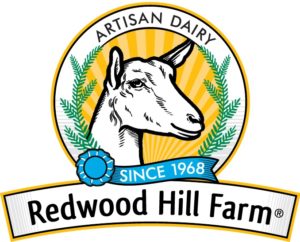
Located among the picturesque redwoods of Sonoma County in Northern California, Redwood Hill Farm & Creamery has been producing award-winning goat milk yogurt, kefir, and cheese for almost 50 years. Created in 2010, the company’s sister brand, Green Valley Organics, makes lactose-free yogurt, kefir, sour cream, and other specialty dairy products. Redwood Hill Farm & Creamery’s vision is to be a “different kind of creamery,” reflecting the values and sustainability of a family farm while creating delicious dairy products of the highest quality for everyone to enjoy.
Beginnings
In 1968, the Bice family moved from Los Angeles to Sebastopol, a quiet town about 60 miles north of San Francisco. Inspired by the Back to the Land movement, the Bices started a farm and goat dairy that would nourish not only their own family, but many others for generations to come. Although this new rural lifestyle took some getting used to, the Bice children quickly fell in love with the farm and animals, raising and showing goats through 4-H. Soon the family had accumulated about 80 goats—enough for an entire herd—and began selling goat milk to local health food stores under the Redwood Hill Farm label.
Growing the Business
In 1978 Jennifer Bice, the oldest of the 10 Bice children, assumed ownership of the farm along with her late husband, Steven Schack. Guided by the same values as her parents—producing delicious and nourishing 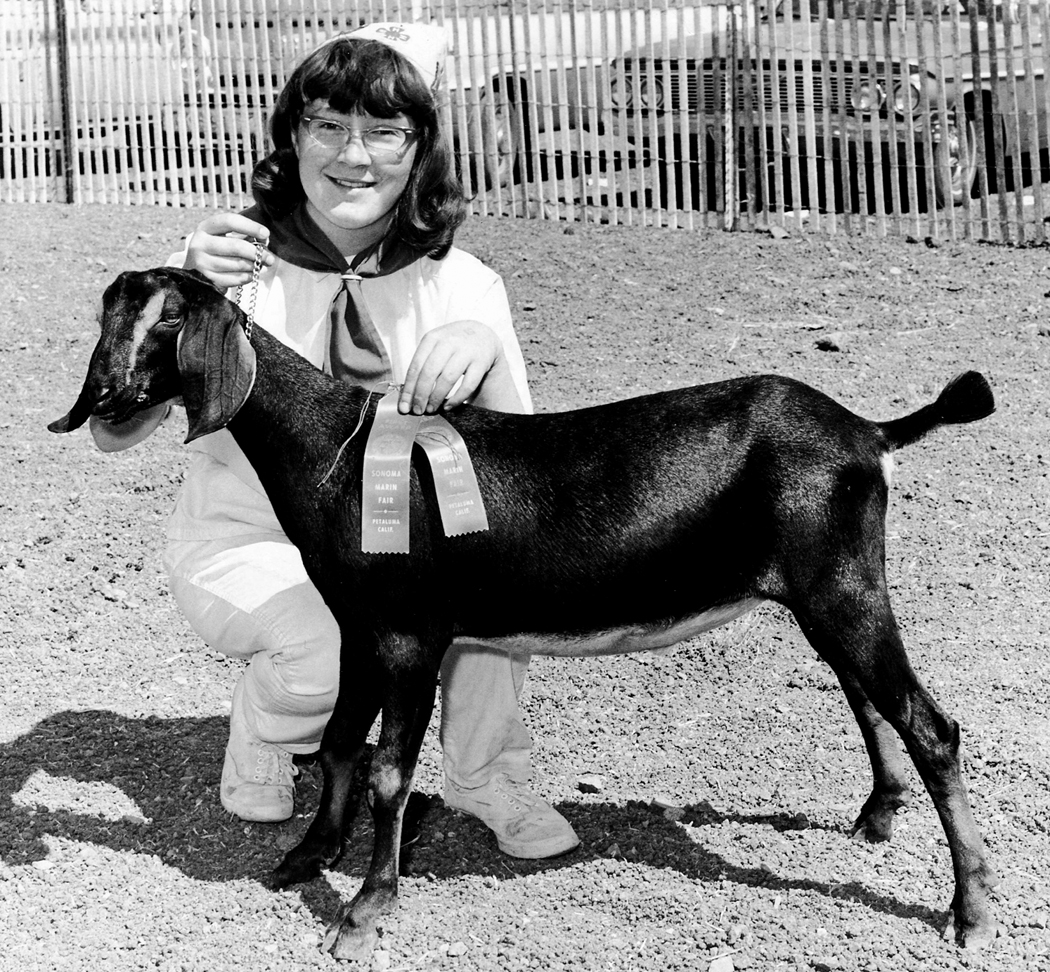 food, treating animals humanely, and giving back to the land—she and Steven expanded the business to produce a greater variety of goat milk products and diversified the dairy goat-breeding program. In 2010, Redwood Hill Farm & Creamery created Green Valley Organics so that people with lactose intolerance could bring real dairy back into their lives, enjoying its health benefits and great taste without digestive troubles.
food, treating animals humanely, and giving back to the land—she and Steven expanded the business to produce a greater variety of goat milk products and diversified the dairy goat-breeding program. In 2010, Redwood Hill Farm & Creamery created Green Valley Organics so that people with lactose intolerance could bring real dairy back into their lives, enjoying its health benefits and great taste without digestive troubles.
A master cheesemaker and expert goat breeder, founder Jennifer Bice runs Redwood Hill Farm & Creamery to this day. Her passionate dedication to goats, as well as her commitment to serving a community of people who could otherwise not enjoy real dairy, was foundational in creating widespread consumption of artisan goat milk products and lactose-free cow milk dairy. Green Valley Organics is the only line of cultured lactose-free dairy in the country.
First Certified Humane® Goat Dairy
Always on the cutting edge of taking care of people, animals and the 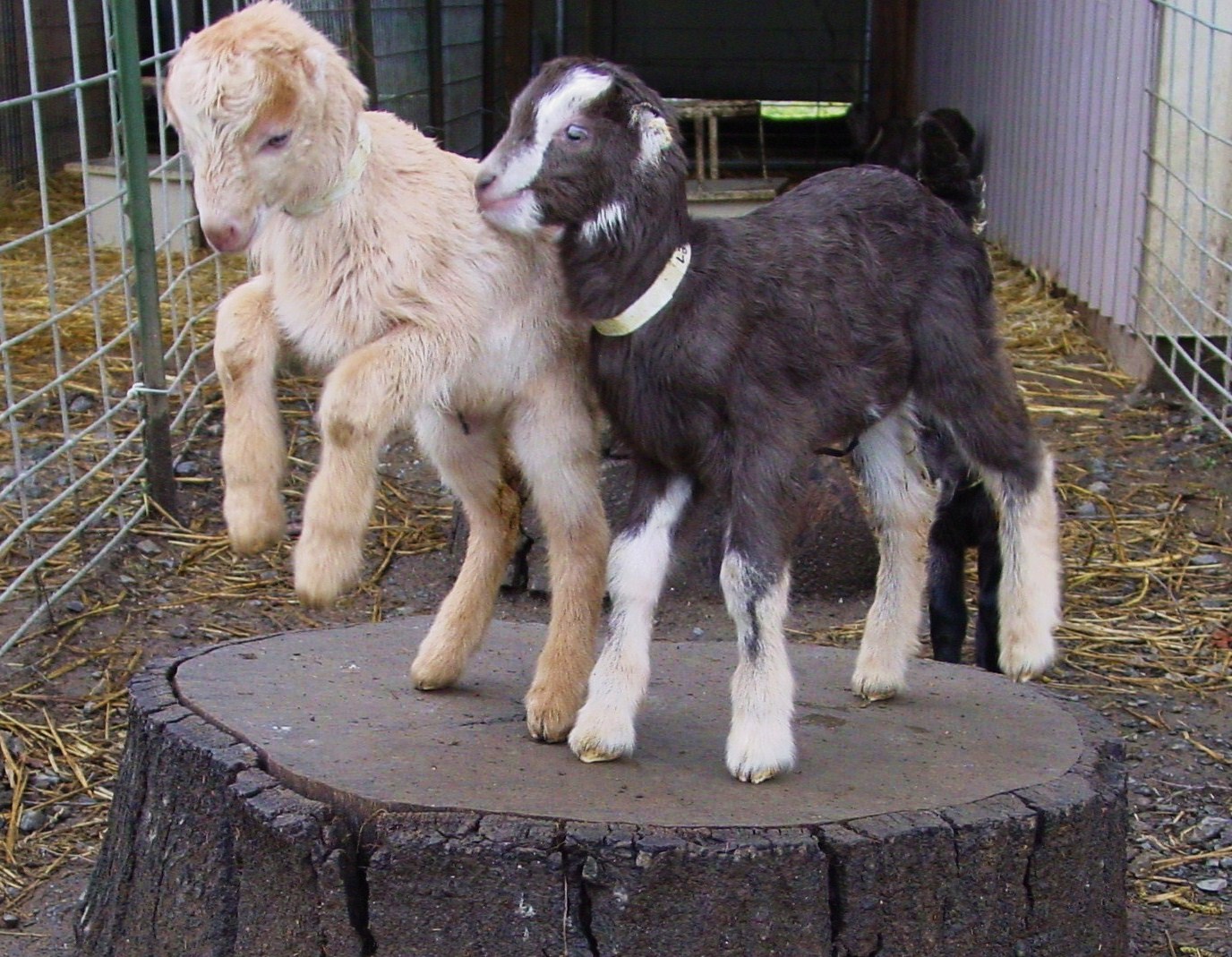 planet, Jennifer Bice’s herd of Saanen, Alpine, Nubian and La Mancha
planet, Jennifer Bice’s herd of Saanen, Alpine, Nubian and La Mancha
dairy goats was the first to become Certified Humane® in the U.S. in 2005. Although her farm had been using humane practices consistent with the Certified Humane® standard for decades, she wanted to give consumers the additional confidence of a third-party certification and the assurance that high standards of animal care were being met.
As the business grew, Redwood Hill Farm & Creamery brought on additional dairies to ensure a steady milk supply. In 2012, the company took their commitment to animal welfare one step further, helping each of their supplying dairies achieve independent certification from Humane Farm Animal Care (HFAC). Being Certified Humane® is now a requirement for all of the family farms that supply milk to Redwood Hill Farm and Green Valley Organics.
Sustainable Values
Sustainability has remained a guiding principle for Jennifer Bice throughout the years. The company’s certified organic creamery, just three miles away from the original Redwood Hill Farm, runs 100% on renewable energy. Two acres of rooftop solar panels provide 85% of its energy needs and the remainder comes from sources like geothermal and wind, via Sonoma Clean Power. Extensive water-saving measures are in place, including a system that pumps graywater to neighboring fields for irrigation. And the company is continually taking steps to make its creamery more sustainable through recycling, insulation, eco-sanitizers, LED and sensor lighting, and electric vehicle charging stations.
Sustainability means investing in the community as well. For over 30 years, Redwood Hill Farm & Creamery has supported youth and agricultural organizations, local health needs and environmental causes, including Community Child Care Council of Sonoma County (4Cs), Center for Climate Protection, Ceres Community Project, Daily Acts, Food for Thought, Land Paths, Marine Mammal Center, Rotary Club Sunrise, Sonoma Humane Society, and Sonoma Land Trust.
To learn more, visit Redwood Hill Farm & Creamery’s website at: Redwood Hill Farm
For information on where to find other Certified Humane® products in your area, visit the “Shop” page of HFAC’s website.
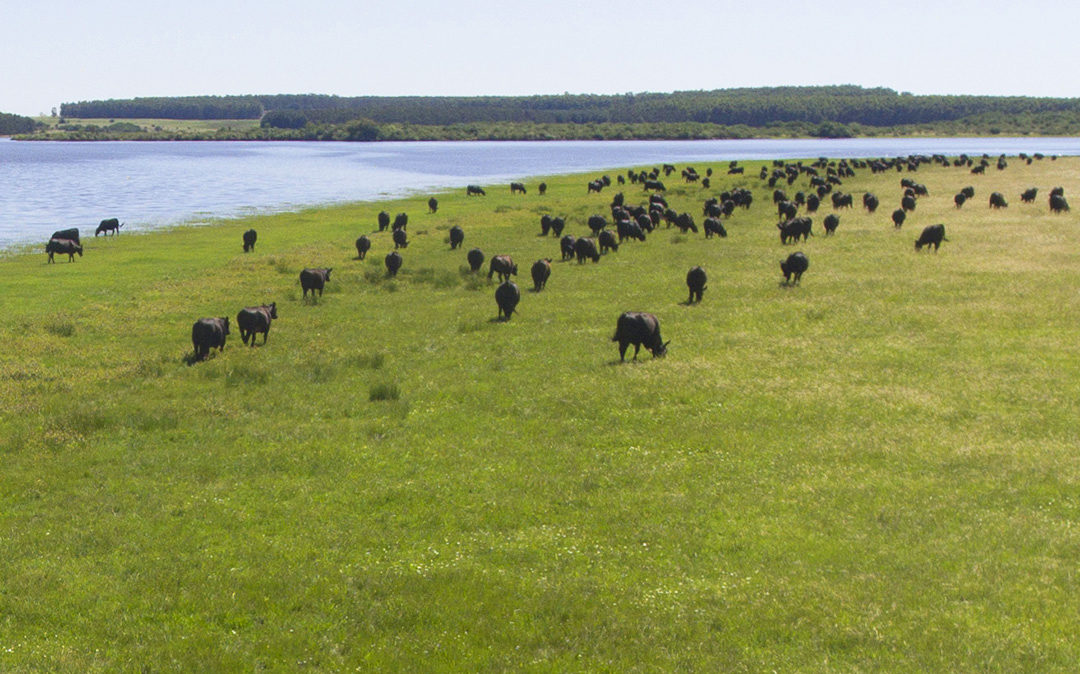


Posted: February 4, 2014 by Certified Humane®
Touchstone Farm
Touchstone Farm of Rappahannock County, Virginia, was started as a part-time project with 25 acres and a decision to raise low impact, grazing animals. Alan told Humane Farm Animal Care, “I was highly methodical at the beginning.” Alan began studying the subject of shepherding carefully, reading all the material he could find and taking cues from another local shepherd. By the time he attended the annual Maryland Sheep and Wool Festival, Alan had narrowed his search. He was looking specifically for a strong animal that would be suited to his part-time shepherding.
The Clun Forest breed, from Shropshire in Wales, fit the bill perfectly. “They have extremely high protein in their milk and meat,” says Alan. The Clun Forest is also a “hardy, low-input sheep,” which was essential to a farm that is a one-man operation. “Most lamb you eat in America is either Aussie lamb or from New Zealand,” says Alan. “It’s frozen and shipped here. You just don’t know anything about it.” Alan’s pursuit of the rich flavor of pasture raised lamb has kept him from feedlots and all packages are processed at Touchstone.
Since 1996 Alan’s flock has been nestled in the Blue Ridge Mountains. Touchstone Farm sheep enjoy lush green pastures of orchard grass, rye grass, clover, native herbs and forbs, and they drink water piped directly from Touchstone Springs. Touchstone Farm does not use any artificial or processed foods, antibiotics or growth supplements.
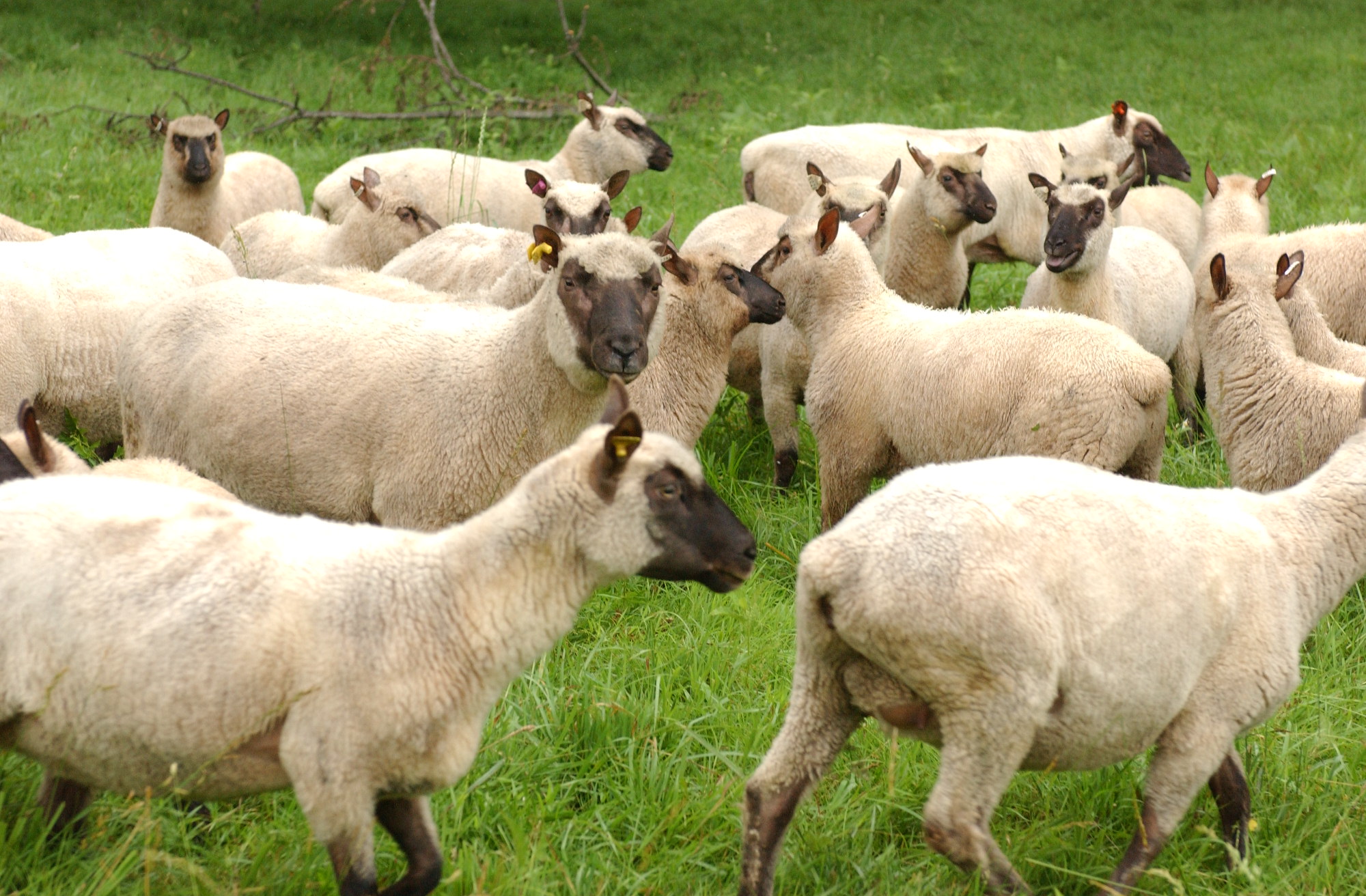
Originally a “weekend venture” it wasn’t long before Alan said he “was bitten hard by the farm bug.” At first, Alan sold lamb to friends and relied on word of mouth to spread his business. His sales have increased since his website began handling orders. Touchstone Farm offers custom cut lamb in the Virginia and Washington DC metropolitan area. Spring lamb is available from March through May and fall freezer lamb is available from September through October. Half and whole lamb packages are processed to customer specifications and you can order at http://www.touchstonefarm.org/tf/default.htm
Alan has grown the original 25 acres of Touchstone Farms to 200 acres of pastures, hayfields and forest. Struck by the beauty of the area and bitten hard by the farm-bug, Alan now usually telecommutes to his Washington, DC job.
For information on where to find other Certified Humane® products in your area, visit the “Shop” page of HFAC’s website.
Posted: February 4, 2014 by Certified Humane®
Summerhill Dairy
Summerhill Goat Dairy, located in Hanford, California has recently joined the Humane Farm Animal Care program as a newly Certified Humane® producer. Founded by John and Anneke de Jong in 1999, Summerhill was originally located in Southern California. Both John and Anneke grew up on family-run dairy farms, and originally had little knowledge about raising and milking goats. When the opportunity arose for them to purchase Summerhill and start raising dairy goats,they began researching everything they could about these gentle creatures. From reading books about goats to working with “goat experts”, Anneke and John found the idea of having a goat farm a new and exciting experience. With their acquired knowledge of goats, they created the ideal environment for their goats to feel safe, comfortable and be the healthiest they could be.
At the end of 2009, Summerhill Dairy relocated to Central California to a larger farm as it outgrew its former, rented facility. Today Summerhill Dairy’s’ 1,000 goats live on 100+ acres of land having access to indoor facilities as well as outdoor areas at all times. While transitioning to their larger farm in 2009, Anneke says, “Johnnie constantly tried to ‘think like a goat,’ only to discover on the first day after moving in, that they had outwitted him. The goats were able to open the gate latches and within hours were all mixed up!”
The large herd of goats found at Summerhill is pleasantly diverse with an array of breeds from LaManchas, Nubians, and Saanans to Alpines and Toggenburg goats. The goats are milked twice daily on the farm with an 84-goat rotary milking system originating from The Netherlands. Every animal uniquely creates milk in due time, therefore the European style rotary milking parlor allows for a more efficient milking process as goats are able to be released from the system when finished milking. The rotary parlor also ensures a less stressful milking process as goats are comfortably moved to the location one by one.
The fresh milk is immediately chilled once obtained from the goats, and then stored in silos. The goat milk is pasteurized at 161 degrees for 15 seconds. This High Temperature Short Time (HTST) system uses less water, power and energy than other methods. “We work hard to be good stewards of our resources. Our new dairy was built with an emphasis on animal comfort and care, energy efficiency and providing quality, natural goat milk for our customers,” John explains about his family run farm.
Once it has been pasteurized to ensure that the milk is free of bacteria or other harmful organisms, it is chilled again and put into quart size bottles. Milk is picked up daily from the farm and delivered to various stores in California.
As animal lovers, experienced humane animal handlers, and now considered goat experts themselves, John and Anneke are pleased to have been awarded the Certified Humane® label for their goat milk:“We have always been committed to the humane care and welfare of our goats. Our customers are very interested in how our animals are cared for and we wanted them to have an additional assurance that we were providing humane care.”
To learn more, visit their website at: www.SummerhillDairy.com
For information on where to find other Certified Humane® products in your area, visit the “Shop” page of HFAC’s website.
Posted: February 4, 2014 by Certified Humane®
Redwood Hill Farm
Located among the picturesque redwoods of Sonoma County in Northern California, Redwood Hill Farm & Creamery has been producing award-winning goat milk yogurt, kefir, and cheese for almost 50 years. Created in 2010, the company’s sister brand, Green Valley Organics, makes lactose-free yogurt, kefir, sour cream, and other specialty dairy products. Redwood Hill Farm & Creamery’s vision is to be a “different kind of creamery,” reflecting the values and sustainability of a family farm while creating delicious dairy products of the highest quality for everyone to enjoy.
Beginnings
In 1968, the Bice family moved from Los Angeles to Sebastopol, a quiet town about 60 miles north of San Francisco. Inspired by the Back to the Land movement, the Bices started a farm and goat dairy that would nourish not only their own family, but many others for generations to come. Although this new rural lifestyle took some getting used to, the Bice children quickly fell in love with the farm and animals, raising and showing goats through 4-H. Soon the family had accumulated about 80 goats—enough for an entire herd—and began selling goat milk to local health food stores under the Redwood Hill Farm label.
Growing the Business
In 1978 Jennifer Bice, the oldest of the 10 Bice children, assumed ownership of the farm along with her late husband, Steven Schack. Guided by the same values as her parents—producing delicious and nourishing food, treating animals humanely, and giving back to the land—she and Steven expanded the business to produce a greater variety of goat milk products and diversified the dairy goat-breeding program. In 2010, Redwood Hill Farm & Creamery created Green Valley Organics so that people with lactose intolerance could bring real dairy back into their lives, enjoying its health benefits and great taste without digestive troubles.
food, treating animals humanely, and giving back to the land—she and Steven expanded the business to produce a greater variety of goat milk products and diversified the dairy goat-breeding program. In 2010, Redwood Hill Farm & Creamery created Green Valley Organics so that people with lactose intolerance could bring real dairy back into their lives, enjoying its health benefits and great taste without digestive troubles.
A master cheesemaker and expert goat breeder, founder Jennifer Bice runs Redwood Hill Farm & Creamery to this day. Her passionate dedication to goats, as well as her commitment to serving a community of people who could otherwise not enjoy real dairy, was foundational in creating widespread consumption of artisan goat milk products and lactose-free cow milk dairy. Green Valley Organics is the only line of cultured lactose-free dairy in the country.
First Certified Humane® Goat Dairy
Always on the cutting edge of taking care of people, animals and the planet, Jennifer Bice’s herd of Saanen, Alpine, Nubian and La Mancha
planet, Jennifer Bice’s herd of Saanen, Alpine, Nubian and La Mancha
dairy goats was the first to become Certified Humane® in the U.S. in 2005. Although her farm had been using humane practices consistent with the Certified Humane® standard for decades, she wanted to give consumers the additional confidence of a third-party certification and the assurance that high standards of animal care were being met.
As the business grew, Redwood Hill Farm & Creamery brought on additional dairies to ensure a steady milk supply. In 2012, the company took their commitment to animal welfare one step further, helping each of their supplying dairies achieve independent certification from Humane Farm Animal Care (HFAC). Being Certified Humane® is now a requirement for all of the family farms that supply milk to Redwood Hill Farm and Green Valley Organics.
Sustainable Values
Sustainability has remained a guiding principle for Jennifer Bice throughout the years. The company’s certified organic creamery, just three miles away from the original Redwood Hill Farm, runs 100% on renewable energy. Two acres of rooftop solar panels provide 85% of its energy needs and the remainder comes from sources like geothermal and wind, via Sonoma Clean Power. Extensive water-saving measures are in place, including a system that pumps graywater to neighboring fields for irrigation. And the company is continually taking steps to make its creamery more sustainable through recycling, insulation, eco-sanitizers, LED and sensor lighting, and electric vehicle charging stations.
Sustainability means investing in the community as well. For over 30 years, Redwood Hill Farm & Creamery has supported youth and agricultural organizations, local health needs and environmental causes, including Community Child Care Council of Sonoma County (4Cs), Center for Climate Protection, Ceres Community Project, Daily Acts, Food for Thought, Land Paths, Marine Mammal Center, Rotary Club Sunrise, Sonoma Humane Society, and Sonoma Land Trust.
To learn more, visit Redwood Hill Farm & Creamery’s website at: Redwood Hill Farm
For information on where to find other Certified Humane® products in your area, visit the “Shop” page of HFAC’s website.
Posted: February 4, 2014 by Certified Humane®
Phils Fresh Eggs
Phils Fresh Eggs in Forreston, Illinois is a family run, second generation, cage-free egg productions facility. Started in the late 1950’s by Phil Wubbena, Phil’s Fresh Eggs developed and pioneered the cage-free egg production model that is utilized around the world today. His son Rod and his wife maintain the farm today as well as the family legacy of 100% cage-free, naturally-fed chickens. Rod runs the farm at the original property in Forreston, Illinois.
The farm began as a dairy production facility in the 1950’s. After dairy farming for several years, Phil decided to try his hand at raising chickens and purchased a complete chicken raising “kit” from a local supplier. It included barns, feed and animals. Some of the original buildings are still standing today.
According to Rod there was a serious learning curve, lots of trial and error, and lots of hard work. “We had four kids in the family. I remember not playing sport or participating in after school activities but rather coming home from school, gathering eggs, feeding pullets and helping at whatever chore I could,” Rod said. “After going away to college I came back to the farm to work and my wife and I eventually purchased the land from my Dad in 2002.”
Making Phil’s unique is their commitment to feeding their hens healthy feed. One of Rod’s favorite sayings is “you are what you eat.” He believes that what holds true for people holds true for chickens, too. Phil’s grows and roasts its own corn and soybeans for chicken feed, combining these grains with the highest-quality natural ingredients such as alfalfa and kelp.
“We had a case where we were using soybeans processed outside of our farm and something got into the system and contaminated the grain. Not knowing it was tainted we fed it to our hens and lost a lot of birds. My father was very concerned and disheartened. He began to experiment with growing and roasting our own soybeans. We were probably the first farm in the nation to have a grain roaster, a practice we still use today,” Rod said.
Phil’s also never compromises its standards with less expensive feed or ingredients, producing a consistently wholesome flavor in their eggs.
Phil’s Fresh Eggs first began to sell their humanely raised eggs to the Chicago market in the 1960’s before anyone had even heard the term “animal welfare.” “In the 1970’s as the health food trend began to become more mainstream, small independent stores began to pick up Phil’s products. The real break came in the 1980’s when the general public became interested in a healthier more naturally raised egg,” Rod said. “Consumers felt that our eggs simply tasted better and began to search them out,” he added.
Phil’s Fresh Eggs has never been about cutting corners to make a profit and still distinguishes themselves from other cage-free producers. According to Rod, “To be clearer, “mainstream” to me represents cage-free producers with nothing more than marketing in their motives. Conventional production with large economies of scale is frequently subsidizing large cage-free complexes these days. Sustainable family farming is a foundation our country must not forsake.”
“It’s an ongoing learning process for us,” said Rod. “We are very interested in sustainable agriculture and are constantly researching and refining the latest methods for producing grain and raising hens. But in the end it really comes down to common sense, common sense about animals and what they need.”
Phil Wubbena worked for over 50 years experimenting and refining commercial cage-free egg production and marketing. Phil was a pioneer in his field back at a time when no one knew what animal welfare meant. He practiced it because he had a love of animals and believed there was a better way – even if the mainstream egg industry was headed in a quite different direction. His humane concerns and healthier feeding methods were years ahead of its time and match today’s consumer preferences for food that is produced closer to nature’s simple ways.
Phil’s Fresh Eggs can be found in large grocery chains as well as natural food markets in the Midwest.
For information on where to find other Certified Humane® products in your area, visit the “Shop” page of HFAC’s website.
Posted: February 4, 2014 by Certified Humane®
Pete and Gerry’s Eggs
Pete and Gerry’s Eggs (along with sister brand Nellie’s Free Range Eggs) became Certified Humane® in 2003, and as such, became the first egg producer in the country to obtain the certification.
Since that time, Pete and Gerry’s Eggs has grown into the largest organic brand in the country, and Nellie’s Free Range has grown into the largest free range brand.
Pete and Gerry’s Eggs and Nellie’s Free Range Eggs have grown by staying small. Instead of achieving growth by adding barn after barn of their own, they’ve partnered with other small family farmers like themselves, most of whom have one or two laying barns on their farm. And they’ve maintained a commitment to animal welfare by meeting, and sometimes exceeding, Humane Farm Animal Care’s (HFAC) standards for space, light, access to the outdoors, feed requirements, fresh water availability, and so on.
To learn more, visit their website at: Pete and Gerry’s Eggs
For information on where to find other Certified Humane® products in your area: